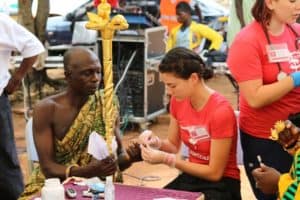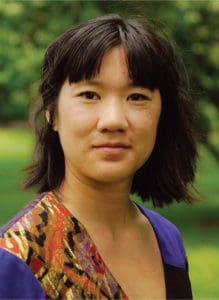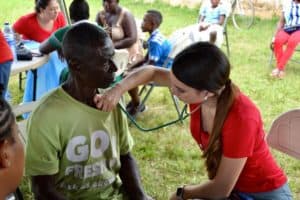Students enrolled in “Business 3000” hone skills valued in the workplace

Courtesy: Project C.U.R.E.
A few days before the start of spring break, two dozen Daniels students gathered for one of the final “Business 3000” classes of the quarter. A nervous confidence permeated through the room, especially following the arrival of two leaders with Project C.U.R.E.—Director of Kit Programs Julie Kreutz King and Director of Communications, Marketing and Public Relations Jan Mazotti.
Over the next hour and a half, the students—split into four groups—presented thoroughly researched proposals for boosting awareness and engagement among millennials for the Project C.U.R.E, a 32-year-old nonprofit organization that delivers medical supplies and equipment to impoverished communities worldwide. Self-assured and well-prepared, each student presenter delivered a key aspect of his or her team’s set of ideas, impressing the real-world audience.
“When we first walked in early in the term, the students were all kind of like deer in the headlights,” said Mazotti, who briefed the class on the challenge with a visit a few weeks into the quarter. “But by the end, they were working together as a really integrated team with everyone in a role. It’s not just book knowledge and number knowledge they’re gaining in this class, but human interaction knowledge.”

Diana Nguyen
The class, formally titled “Strategic Business Communications,” is taught by Diana Khoi Nguyen, teaching assistant professor of management, and is built around three core skills demanded by employers: written communication, verbal communication and listening.
“I was initially surprised it wasn’t all lecturing and tests, but it was really the intangibles you need for the workplace,” said student Blake Valerius, a junior at Daniels. “Given the topic, the approach fit quite well.”
Recently added as an undergraduate business degree core requirement, “Strategic Business Communications” is linked with the Daniels Professional Development Program, which was established in response to employers’ preferences for well-rounded undergraduates who have a fuller understanding of the day-to-day working world.
The course directly addresses the top career readiness competencies desired by employers of recent graduates, according to the National Association of Colleges and Employers 2018 Job Outlook survey. It also seeks to improve Daniels grads’ standing in a marketplace where only 55.6 percent of employers in the NACE survey rated recent graduates as at least proficient in oral and written communications.
In addition to teaching the basics of business writing, Nguyen instructs students on keeping such communications professional, inclusive, non-offensive and free of bias while crafting messages that connect with the intended audience. To help students navigate the ubiquitous fear of public speaking, she leverages storytelling and improvisational approaches while encouraging each student to develop his or her own style.

Courtesy: Project C.U.R.E.
“The first five weeks are foundational, but in the second half of the course, the students’ efforts and attention are turned to the live case study,” Nguyen said. “They put their skills to a practical use for real stakes.”
Just as critically, the class stresses listening skills, which Lisa Victoravich, associate dean and director of undergraduate programs, identified as an important facet of the course after observing a clear skills gap among Daniels students.
“The need to focus on listening as a skill is very apparent based on my interactions with students in the classroom,” Victoravich said. “When I graded student assignments and received emails with questions, it made me question the quality of undergraduate students’ listening skills, which are key to becoming a successful leader in the business world.”
During the quarter, Nguyen has her students present in small groups and in front of the whole class, film themselves practicing presentations, solicit peer feedback and carefully note non-verbal cues.
“An actual comment from one of my students was ‘Why did I look so angry when I was talking about something exciting?’” Nguyen said. “To be proficient as a communicator means being self-aware of how you come across to others.”

Courtesy: Project C.U.R.E.
By the day of the final presentations, the students acknowledged a new level of confidence.
“I’m not going to be the shy one at my internship this summer,” said Abby Javernick, a junior at Daniels. “I’ll have no problem with public speaking or preparing a memo that will go to my boss.”
As for the mid-March presentations, once all were completed, Nguyen’s students retreated to the hall to allow King and Mazotti to determine which plan they believed was the best fit. The declared winner had crafted an awareness strategy that included a partnership with DU’s Study Abroad program, integration with the school’s fraternity and sorority philanthropic efforts and leveraged participants’ willingness to share on social media.
A week later, however, Mazotti acknowledged that the organization had reached out to all four groups to explore some aspect of their presentation.
“All of them brought such a different perspective with different ideas,” she said. “And since there were so many good ideas, we’d love to try to figure out how to make all of them happen.”
